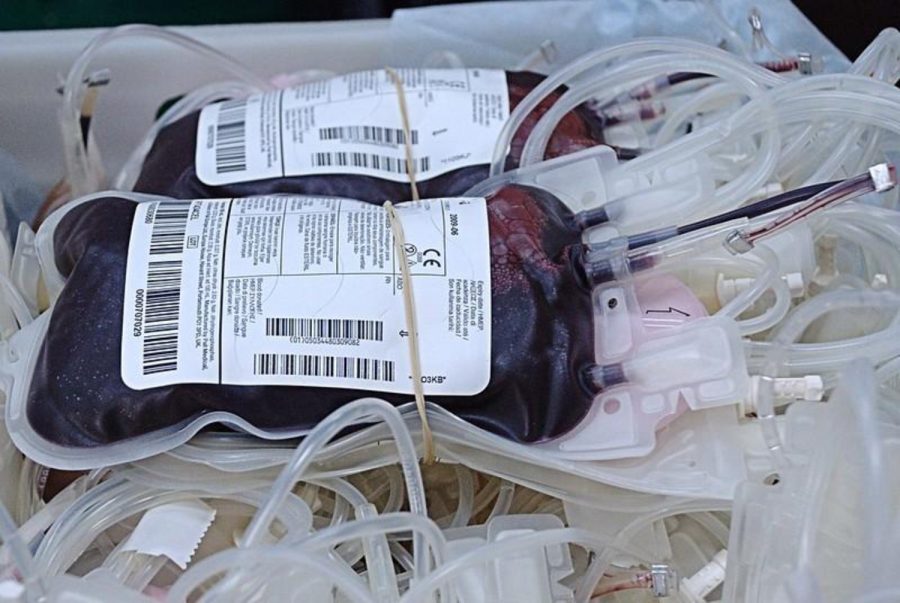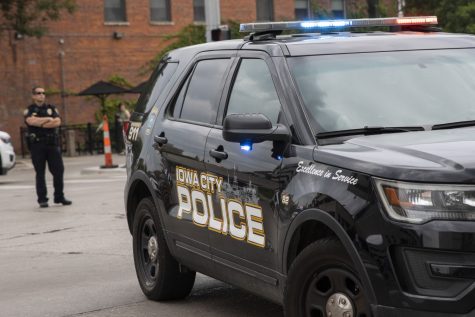UI Annual Homecoming Blood Drive adapts for COVID-19, sees increase in donations
The University of Iowa’s DeGowin Blood Center Student Organization held its first blood drive of the semester where it saw an increase in donations this year from previous years.
The Red Cross is seeking blood donations after the cancellation of blood drives created a shortage. Photo by Antonio via Flickr.
October 4, 2020
As the pandemic continues, the University of Iowa’s DeGowin Blood Center Student Organization is working to get more students to donate blood on campus.
To adapt to COVID-19, DeGowin Blood Center Student Organization President John Dickens said the organization altered its annual Homecoming Blood Drive to last three days instead of one during the last week of September — a decision that aimed to increase numbers while remaining safe.
Dickens said only three people could donate at one time in the Iowa Memorial Union, where the blood drive was held. Appointments, which had to be made before students and other community members could donate, were 30 minutes long, and at least one person was there for each time slot over the three days, he said.
While organizing a blood drive is difficult because of COVID-19, Dickens said he was impressed by the organization and how many people scheduled appointments.
“We’ve been working really hard to get blood drives on campus,” he said. “We actually weren’t able to do any drives before Homecoming. It’s really hard to organize a blood drive in time to make sure people are signing up for appointments and then coming in on time for them. When you have a walk-in drive, it’s easier, but we can’t do that this year.”
Jessica Hinrichs, a blood-drive coordinator at DeGowin who advises the student organization, said the three-day drive led to an increase in donors this fall.
This year’s total units donated was higher than the last two years, with 41 units collected, she said. Thirty-five units were collected in 2018, and there were 18 in 2019. Hinrichs said the center is working to both motivate more registered donors to come donate and ensure donors’ safety.
“It’s hard to find spaces on campus that are big enough for the drives because we want to ensure we’re doing them in the safest way possible,” she said. “We’re still figuring out where and how to offer blood drives so it’s in the most ideal spot for our current situation. I’m also working with different student organizations to get more drives on campus to keep the numbers [of donations] up and keep connections with student donors.”
RELATED: DeGowin Blood Center adapts to COVID-19 while running satellite drives
Regardless of COVID-19, Donor Center Supervisor Kerry DuBay said there will always be a need for blood. Currently, she said, there is an increased need for O and A blood types, but what type is in need is always changing.
“Whether there’s a health epidemic going on or not, the need for donors has never gone away,” she said. “We are always in need of donors. And when people donate with DeGowin, there is a very local impact. All of the blood we collect is used for UI healthcare patients. Knowing that students will be going virtual after Thanksgiving, we want students to continue donating before they leave town.”
We are in particular need of A Negative and O Positive whole blood donors this week. If you can help, consider scheduling a donation at one of our blood drives: https://t.co/gM8SGyeMLr pic.twitter.com/ud1UX2F5oQ
— University of Iowa DeGowin Blood Center (@DeGowin) September 14, 2020
UI third-year student Danielle Luettel, who serves as the DeGowin Blood Center Student Organization’s treasurer, said she donated blood during the Homecoming drive this fall. She said the process is very similar to donating before COVID-19.
“You always answer the questionnaire and everything like that, but the one thing that changed was the distance,” Luettel said. “The conversations are more distant. Wearing masks while giving blood was challenging for some donors. I didn’t personally have a reaction, but some people got overheated … Other than that, the donation process is pretty much the same.”
Dickens said the changes that have been made to protect health-care workers and donors at blood drives this year may make donating daunting for some people, it is important to understand the need for blood and that donors’ safety is always prioritized, regardless of the pandemic.
“Donating blood is more important than ever,” Dickens said. “It’s a scary time for everyone and it’s hard to get yourself to go somewhere new and interact with people outside of your circle, but new protocols have been put into place to keep everyone safe, more now than ever, to make sure that donors stay safe so they can still donate.”





















